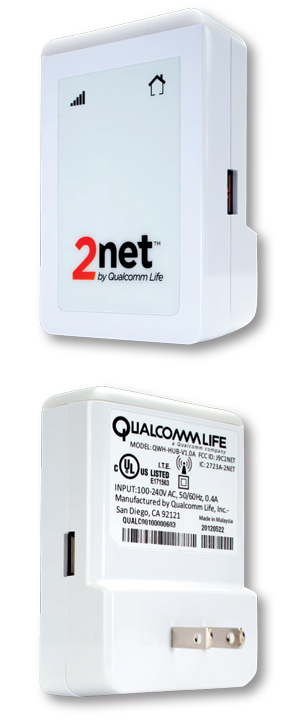Posted in Mobile Health by Nancy Crotti on January 7, 2015
A little more than a year ago, a top executive of Qualcomm Life predicted that smartphones would one day be considered medical devices.

Qualcomm's 2Net Hub is a plug-and-play home gateway for health monitoring devices.
The Qualcomm (QCOM) subsidiary is moving closer to reaching that goal, announcing partnerships with pharmaceutical company Novartis and drugstore chain Walgreens.
Novartis has chosen Qualcomm Life’s 2net technology to upload patient data from medical devices during clinical trials, according to an announcement by Qualcomm. In a separate statement, the company announced an agreement to use the same technology to connect Walgreens’ mobile and Web applications to the medical device and care coordination parts of the drug store chain’s customer loyalty program.
The Novartis agreement will employ the San Diego–based communications giant’s 2net mobile-enabled smartphones to collect and aggregate biometric data from medical devices and transmit them securely via a cloud-based platform to the Novartis study coordinator. The technology will allow patients who suffer from chronic lung disease to remain in their homes during the study, which will not involve drugs, the company said.
Within the Walgreen apps, Qualcomm Life’s 2net platform will securely transmit data from blood pressure cuffs and blood glucose meters to pharmacists for remote patient monitoring, transitional care support and chronic care management, the company said. The service will be available in the first half of this year.
Qualcomm introduced its 2net platform in 2011 for use with Class I, II, and III medical devices. In one and a half years, it grew from 40 to more than 250 device manufacturers and other companies in technology.
In 2013, Qualcomm Life introduced 2netMobile, a service that aggregates medical data from various medical sensors into a single channel. 2net Mobile works on an array of smart devices and complies with HIPAA specifications.
Last year, Qualcomm’s 2net Hub became one of the first hubs that is both an FDA Class I medical device and is able to communicate with devices using Bluetooth Smart, which is more energy-efficient than standard Bluetooth technology.
More than 90% of the medical device makers Qualcomm is working with are either launching or planning to launch the next iteration of their devices as Bluetooth Smart, to drain less energy from medical devices and ease use for patients.
Walgreens isn’t letting any Luddite-laden grass grow under its feet. The company has also teamed with up-and-coming Theranos to open on-site laboratories within its stores in the Phoenix and Palo Alto areas, with plans for expansion. Theranos labs perform low-cost tests on blood, urine, and other samples, drawing blood via a needle stick or the traditional venous method.
The CEO of Theranos is a one of the youngest billionaires in the life science industry and intent on radically changing how blood testing is performed in the United States, making an array of diagnoses possible using only a single drop of blood.





